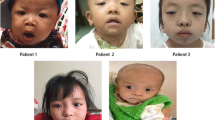Abstract
Noonan syndrome is a highly variable disorder that has significant phenotypic overlap with Costello syndrome and cardio-facio-cutaneous syndrome. KRAS mutation was the second reported gene for Noonan syndrome. This study screened for mutation of the KRAS gene in 57 unrelated ethnic Chinese children suffering from Noonan syndrome without PTPN11 gene mutation in Taiwan. This work only identified two patients with different missense mutations (c.40G>A, p.Val14Ile; c.108A>G, p.Ile36Met) in the exon 1 of KRAS gene. This study also analyzed the characteristics of 34 reported cases involving KRAS mutations in the literature. All these patients presented with variable phenotypes, including Noonan syndrome (n = 19), cardio-facio-cutaneous syndrome (n = 7), Costello syndrome (n = 6), and Noonan/cardio-facio-cutaneous syndrome (n = 1). The phenotype of KRAS mutations was generally severe, including short stature, mental retardation, heart defects, etc. In conclusion, this investigation demonstrates that KRAS mutations are the cause in a minority of cases of Chinese patients with Noonan syndrome in Taiwan.

Similar content being viewed by others
Abbreviations
- NS:
-
Noonan syndrome
- CFC:
-
Cardio-facio-cutaneous syndrome
- CS:
-
Costello syndrome
References
Aoki Y, Niihori T, Kawame H et al (2005) Germline mutations in HRAS proto-oncogene cause Costello syndrome. Nature Genet 37:1038–1040
Bertola DR, Pereira AC, Brasil AS et al (2007) Further evidence of genetic heterogeneity in Costello syndrome: involvement of the KRAS gene. J Hum Genet 52:521–526
Carta C, Pantaleoni F, Bocchinfuso G et al (2006) Germline missense mutations affecting KRAS isoform B are associated with a severe Noonan syndrome phenotype. Am J Hum Genet 79:129–135
Denayer E, Legius E (2007) What’s new in the neuro-cardio-facial-cutaneous syndromes. Eur J Pediatr 166:1091–1098
Fryssira H, Leventopoulos G, Psoni S et al (2008) Tumor development in three patients with Noonan syndrome. Eur J Pediatr 167(9):1025–1031
Hung CS, Lin JL, Lee YJ et al (2007) Mutational analysis of PTPN11 gene in Taiwanese children with Noonan syndrome. J Formos Med Assoc 106:169–172
Kratz CP, Niemeyer CM, Zenker M (2007) An unexpected new role of mutant Ras: perturbation of human embryonic development. J Mol Med 85:227–235
Nava C, Hanna N, Michot C et al (2007) Cardio-facio-cutaneous and Noonan syndromes due to mutations in the RAS/MAPK signaling pathway: genotype–phenotype relationships and overlap with Costello syndrome. J Med Genet 44:763–771
Niihori T, Aoki Y, Narumi Y et al (2006) Germline KRAS and BRAF mutations in cardio-facio-cutaneous syndrome. Nature Genet 38:294–296
Pandit B, Sarkozy A, Pennacchio LA et al (2007) Gain-of-function RAF1 mutations cause Noonan and LEOPARD syndromes with hypertrophic cardiomyopathy. Nat Genet 39:1007–1012
Razaque MA, Nishizawa T, Komoike Y et al (2007) Germline gain-of-function mutations in RAF1 cause Noonan syndrome. Nat Genet 39:1013–1017
Roberts AE, Araki T, Swanson KD et al (2007) Germline gain-of-function mutations in SOS1 cause Noonan syndrome. Nat Genet 39:70–74
Rodriguez-Viciana P, Tetsu O, Tidyman WE et al (2006) Germline mutations in genes within the MAPK pathway cause cardiofacio-cutaneous syndrome. Science 311(5765):1287–1290
Schubbert S, Zenker M, Rowe SL et al (2006) Germline KRAS mutations cause Noonan syndrome. Nat Genet 38:331–336
Søvik O, Schubbert S, Houge G et al (2007) De novo HRAS and KRAS mutations in two siblings with short stature and neuro-cardio-facio-cutaneous features. J Med Genet 44:e84–e89
Tartaglia M, Mehler EL, Goldberg R et al (2001) Mutations in PTPN11, encoding the protein tyrosine phosphatase SHP-2, cause Noonan syndrome. Nat Genet 29:465–468
Zenker M, Buheitel G, Rauch R et al (2004) Genotype–phenotype correlations in Noonan syndrome. J Pediatr 144:368–374
Zenker M, Lehman K, Schulz AL et al (2007) Expansion of the genotype and phenotypic spectrum in patients with KRAS germline mutations. J Med Genet 44:131–135
Acknowledgements
This research was supported by Grant CMRPG46001 awarded by the Chang Gung Memorial Hospital, Taiwan. Ted Knoy is appreciated for his editorial assistance.
Author information
Authors and Affiliations
Corresponding author
Rights and permissions
About this article
Cite this article
Lo, FS., Lin, JL., Kuo, MT. et al. Noonan syndrome caused by germline KRAS mutation in Taiwan: report of two patients and a review of the literature. Eur J Pediatr 168, 919–923 (2009). https://doi.org/10.1007/s00431-008-0858-z
Received:
Accepted:
Published:
Issue Date:
DOI: https://doi.org/10.1007/s00431-008-0858-z




